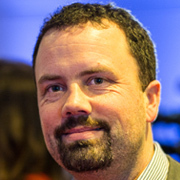
Alexander Behse
German-born Alexander Behse moved to New Zealand in 2002, after completing an MA in producing at Sydney University of Technology. In New Zealand he gained work as an off and online editor on a run of TV shows, from current affairs and Anzac Day ceremonies, to Mike King-presented Treaty series Lost in Translation.
Behse also holds an MA in European Audio-visual Management from Spain’s Media Business School. He began exercising his production muscles with The Flight of the Hookioi (2009), which recreated the 19th Century journey of two Māori rangatira to Austria. Hookioi director Tearepa Kahi was nominated for Best Director at the 2010 Qantas Awards. Negotiating iwi consent was was a groundbreaking experience. Behse has described walking on to the marae for the first time as "very scary. There were moments in there where I would have just liked to walk out ... The Māori world is different. It is their story, no matter how old it is.”
Hookioi marked the first of many explorations of te ao Māori. Follow-up Allan Baldwin: In Frame (2011) profiled a photographer’s work recording tā moko on Māori kuia (female elders). Also directed by Kahi, the documentary was awarded at the 2013 Wairoa Māori Film Festival and Tahiti's FIFO documentary fest. Press writer Trevor Agnew argued that the filmmakers treated Baldwin “with the same sincerity he treated others, and the result is a jewel of filmmaking.
The Road to the Globe, followed a te reo production of Shakespeare’s Troilus and Cressida at the Globe Theatre in the UK. It won a second jury prize at FIFO in 2013 and sold to PBS in the US. Behse went on to produce popular primetime series Radar across the Pacific, in which presenter Te Radar explored the culture and history of the Pacific islands. It won Best Factual Series at the 2012 NZ TV Awards. Behse would go on to produce revisionist NZ history series Radar’s Chequered Past.
In 2014 Behse trailed Swazi clothing outdoorsman Davey Hughes for 2014 Prime TV series Davey Hughes - Untamed. In 2015 he wrangled Māori Television doco Freezing Works, in which director Mike Jonathan followed a group, mainly Māori, heading off for a working OE in Iceland.
Behe made his directorial debut in 2012 with Nazi Hunter, which follows an ex-policeman investigating escaped Nazi collaborators in Aotearoa. The documentary was made for TV3’s Inside New Zealand doco slot.
Documentary Ever the Land premiered at the 2015 NZ International Film Festival, and has travelled to festivals in Vancouver, Hawaii and New York. Behse teamed up with another German-Kiwi — director Sarah Grohnert — to chronicle an architectural and cultural journey towards realising a Tūhoe HQ in Taneatua. The Ngāi Tūhoe grand design — a collaboration between iwi and architects Jasmax — aimed to embody the people's self-determination, and become Aotearoa’s first completely sustainable “living building”. The NZ Herald's Peter Calder praised the gentle, observational tone as “enchanting. It's an impressive little film that deserves attention. And the building's pretty damn cool, too.” Flicks writer Liam Maguren called it “gorgeous, elegant, and breath-haltingly profound.”
2016 saw the release of Poi E, a Moa-nominated documentary on the iconic song, directed by his frequent collaborator Tearepa Kahi. Following this in 2017 is the release of Kim Dotcom: Caught In The Web, a look into the life of the controversial German internet millionaire, directed by Annie Goldson. He is also executive producing Gaylene Preston documentary My Year with Helen, about former Prime Minister Helen Clark.
Sources include
Alexander Behse
Chris Barton, 'Strangers in a strange land: Toetoe and Te Rerehau in Vienna' - The NZ Herald, 17 October 2009
Peter Calder, ‘Movie Review: Ever the Land’ - The NZ Herald, 28 August 2013
Liam Maguren, 'Ever the Land' (Review) Flicks website, July 2015
Grant Smithies, ‘All the world’s a stage for Rawiri’ - The Sunday Star-Times, 21 April 2013